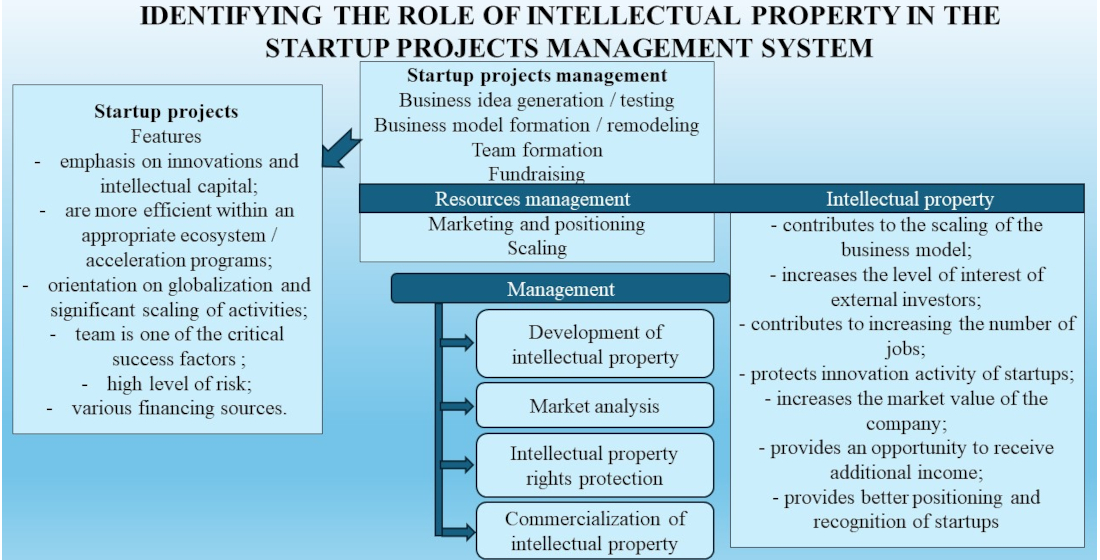Identification of the role of intellectual property in the startup projects management system
DOI:
https://doi.org/10.15587/2706-5448.2024.310545Keywords:
entrepreneurship, innovation activity, startup, startup project management, intellectual property, intellectual property rightsAbstract
The object of the research in the paper is intellectual property as one of the key resources of startup projects. The research is aimed at providing the understanding of intellectual property role in ensuring the efficiency of startup projects management and overcoming its undervaluing. Current conditions of Ukrainian enterprises functioning demand the search of effective tools for forming competitive advantages and ensuring the recovery of economy, that emphasizes the necessity of innovation activity activation. The study focused on startup projects as one of the forms of activation of innovation activity. The author proposed the definition of a startup as a temporary structure (organized in the form of a business entity and/or project), which has innovative characteristics of the business model, generates an innovative product and is aimed at significant growth and scaling. Startup projects have their peculiarities which influence the respective management system. On the basis of the conducted research the directions of startup projects management were identified, one of which is the management of startup project resources. Intellectual property, in its turn, is one of the key resources of startup projects considering the innovative nature of their business models. Efficient management of the intellectual property objects is capable of forming significant advantages for the startup project, which will result in its performance indicators. The main directions of intellectual property management in startup projects include development of intellectual property, market analysis, protection of intellectual property rights, commercialization of intellectual property rights. Ensuring the efficiency of the intellectual property management provides for the observance of relevant principles, the main of which include the principles of systematicity, reasonableness, efficiency, alternativeness, ensuring development, adaptability, social responsibility. The obtained research results will contribute to increasing the awareness of startup founders regarding the role and peculiarities of management of intellectual property.
References
- Zakryttia FOPiv v Ukraini zroslo na 54%, a kompanii – na 15% (2024). YouControl Market blog. Available at: https://blog.youcontrol.market/zakrittia-fopiv-v-ukrayini-zroslo-na-54-a-kompanii-na-15/
- Kolosok, A., Koniukh, I. (2018). Definition of Startup Projects, Main Problems and Prospects of Development. Economic Journal of Lesya Ukrainka Volyn National University, 4 (12), 62–67. https://doi.org/10.29038/2411-4014-2017-04-62-67
- Analyze search results (2024). Scopus database. Available at: http://surl.li/jjlfql
- Hirschmann, M., Block, J. H. (2022). Trademarks and how they relate to the sustainability and economic outcomes of social startups. Journal of Cleaner Production, 376, 134320. https://doi.org/10.1016/j.jclepro.2022.134320
- Baran, A., Zhumabaeva, A. (2018). Intellectual property management in startups – problematic issues. Engineering Management in Production and Services, 10 (2), 66–74. https://doi.org/10.2478/emj-2018-0012
- Holgersson, M., Granstrand, O. (2021). Value capture in open innovation markets: the role of patent rights for innovation appropriation. European Journal of Innovation Management, 25 (6), 320–339. https://doi.org/10.1108/ejim-02-2021-0114
- Artemenko, L., Pichugina, M., Kotsko, T. (2021). Strategizing of startup activity company: initialization and project implementation. Economic Bulletin of National Technical University of Ukraine «Kyiv Polytechnical Institute», 18, 135–140. https://doi.org/10.20535/2307-5651.18.2021.240433
- Seitz, N., Lehmann, E. E., Haslanger, P. (2023). Corporate accelerators: design and startup performance. Small Business Economics, 62 (4), 1615–1640. https://doi.org/10.1007/s11187-023-00817-8
- Virágh, E. A., Tímár, G., Pecze, K. (2024). Startup success from the founder’s perspective. Society and Economy. https://doi.org/10.1556/204.2023.00029
- Ries, E. (2011). The Lean Startup: How Today’s Entrepreneurs Use Continuous Innovation to Create Radically Successful Businesses. Crown Currency, 336.
- Global Startup Ecosystem Ranking 2023 (Top 30 + Runners-Up) (2023). Startup Genome. Available at: https://startupgenome.com/article/global-startup-ecosystem-ranking-2023-top-30-plus-runners-up
- Strilets, V., Franko, L., Dykha, M., Ivanov, M., Rybina, L. (2024). The influence of innovative development in the EU countries and Ukraine on the competitiveness of national economies: A comparative analysis. Problems and Perspectives in Management, 22 (2), 1–16. https://doi.org/10.21511/ppm.22(2).2024.01
- What is Intellectual Property? World Intellectual Property Organization. Available at: https://www.wipo.int/about-ip/en/
- Tsyvilnyi Kodeks Ukrainy (2003). Kodeks Ukrainy No. 435-IV. 16.01.2003. Available at: https://zakon.rada.gov.ua/laws/show/435-15#Text
- Semenova, V. H. (2015). To more efficient management of intellectual property enterprises. Global and national problems of economy, 6, 472–476. Available at: http://global-national.in.ua/archive/6-2015/06_2015.pdf#page=473

Downloads
Published
How to Cite
Issue
Section
License
Copyright (c) 2024 Kateryna Orlova

This work is licensed under a Creative Commons Attribution 4.0 International License.
The consolidation and conditions for the transfer of copyright (identification of authorship) is carried out in the License Agreement. In particular, the authors reserve the right to the authorship of their manuscript and transfer the first publication of this work to the journal under the terms of the Creative Commons CC BY license. At the same time, they have the right to conclude on their own additional agreements concerning the non-exclusive distribution of the work in the form in which it was published by this journal, but provided that the link to the first publication of the article in this journal is preserved.







